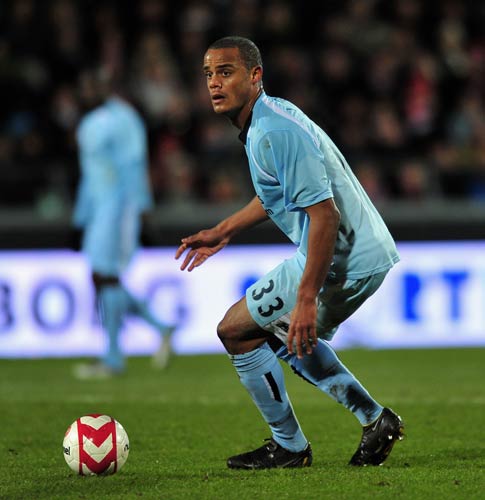Belgian general ensures City are in good Kompany
Midfield marshal is free of pain and looking to avoid second-season syndrome

Your support helps us to tell the story
From reproductive rights to climate change to Big Tech, The Independent is on the ground when the story is developing. Whether it's investigating the financials of Elon Musk's pro-Trump PAC or producing our latest documentary, 'The A Word', which shines a light on the American women fighting for reproductive rights, we know how important it is to parse out the facts from the messaging.
At such a critical moment in US history, we need reporters on the ground. Your donation allows us to keep sending journalists to speak to both sides of the story.
The Independent is trusted by Americans across the entire political spectrum. And unlike many other quality news outlets, we choose not to lock Americans out of our reporting and analysis with paywalls. We believe quality journalism should be available to everyone, paid for by those who can afford it.
Your support makes all the difference.Even while his second season in England is only beginning to evolve, we are entitled to ask: does any player in the Premier League more thrillingly combine sheer physical might with such a delicate grace as Vincent Kompany? There is something compelling in the way this young Manchester City player so effortlessly marshals the great power of his frame and the finesse with which he makes his way in the game. Of all the shining talents that this re-imagined club has lavished its wealth on, there is an insistent notion that perhaps the most enduringly significant will be that of the Belgian international.
He recently signed a new five-year contract, but then how much trust do we really place in such paperwork when players can now engineer their next move with a brazen efficiency? Perhaps we might consider, instead, that his worth is best measured in other ways. During the final months of last season, when City were straining to assert something of the ascendancy the new owners were so intent on establishing, Kompany played with damaged bones and ligaments in his foot.
We can be sure that, at a time when the dressing room was a lurching imbalance of egos and the club's renowned project was in the fraught days of its infancy, many other players would have slunk away from the frontline. Yet Kompany endured "four or five" painkilling injections before each match, then "two or three" at half-time. And still he performed with a serene forcefulness, either at centre-back, where his muscularity was poised, or in midfield, where he brought such a careful dominance to bear that his distribution and positioning were exemplary.
"It was more than painful and I could have decided to operate straight away, but I kept on playing because the management staff told me that I was needed," he says. "That's the way I am. It was funny, because still people were saying, 'he's put in a good performance'. I was just happy to be able to run, so whenever one of you guys said something positive about me, it felt like a bonus."
Having returned to full fitness one month ahead of schedule, he made his first appearance of the season as a substitute against Wigan Athletic last week. An essential rustiness will have to be smoothed from his game, but still he brings an emphatic reassurance to the team.
At 23, he plays with a time-served certainty, but then he made his Anderlecht debut at 16, played in the Champions' League and for Belgium at 17, and was so astute that he then turned down the advances of Chelsea, Lyon and Juventus because he sensed that his career would stall on the periphery at these gilded clubs.
He eventually chose to further his career at Hamburg, only for an achilles injury to condemn him to eight months of rehabilitation. Even then, he revealed an essentially benevolent nature. After undergoing an operation, he found himself sharing a ward with Aki Riihilahti, the former Crystal Palace midfielder, and they arranged for flowers to be delivered to every female member of staff in the hospital. The playfulness would have been merely charming had the medical staff not believed that his career might be at risk.
When Kompany signed for City in August last year, he expected to meet Thaksin Shinawatra, only to discover that the owner had fled into hiding. His decision to move to Eastlands seems nothing more profound than an act of faith. "Sometimes you've got to follow your feelings," he says. "When they told me what they were trying to build, I believed it. I've always had the highest ambitions for my career and this club is moving forward to those things. This is just right for me."
Signing players such as Kolo Touré, Emmanuel Adebayor and Carlos Tevez has altered the dynamic of the City dressing room, where a winning mentality has become quickly pronounced. For Kompany, who was Belgium's Player of the Year, Players' Player of the Year, Young Player of the Year and Black Player of the Year in one single season, this revision has carried the weight of a vindication.
"Last season we had a squad with a lot of talent, but the mentality was totally different," he says. "The players who came in are professional, they are winners, and it changed everything for the better."
His idols were Marcel Desailly and Patrick Vieira, and it is a rousing thought for Manchester City that Kompany might yet become a similarly dominant figure.
Join our commenting forum
Join thought-provoking conversations, follow other Independent readers and see their replies
Comments